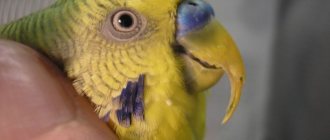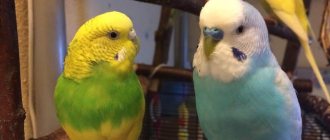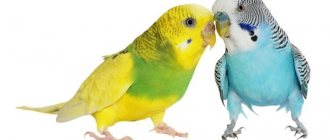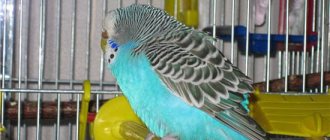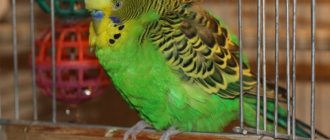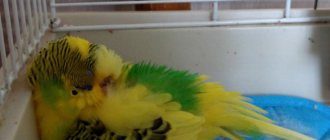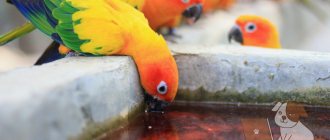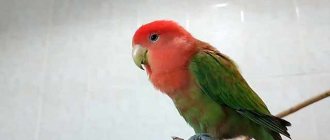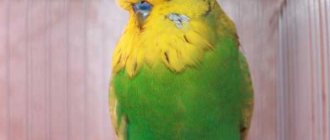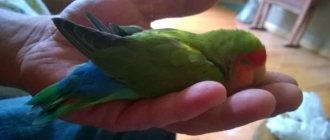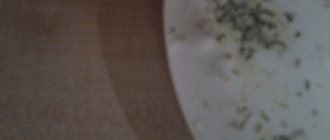Digestive disorders periodically occur in any pet, budgies are no exception. If this is your first time encountering the phenomenon of diarrhea in a parrot, think about where this trouble could have come from. The cause of diarrhea is sometimes the consumption of low-quality food, but it can also mean serious health problems.
What is diarrhea
Diarrhea in a parrot is frequent liquid discharge from the cloaca. If there is a lot of liquid in the droppings, but there is a formed part, then this is not considered diarrhea. This happens when a bird eats a lot of greens and fruits. But if the nature of bowel movements changes, you should be wary. It is bad if the droppings are colored in an unnatural color: yellow, poisonous green, white. Far from normal - a pungent smell, foam, an admixture of blood, mucus and bile.
Diarrhea, as such, is not a disease. It is just a signal that a malfunction has occurred in the body. Such alarming signs cannot be ignored, because birds become dehydrated very quickly. In order to clarify the causes as soon as possible and begin treatment for diarrhea, the budgerigar is taken to the veterinarian for an examination.
Bloody discharge
Most often, the appearance of blood in the stool causes the development of worms. Parasites also provoke severe thirst, exhaustion, and changes in plumage color. In particularly severe situations, small worms may appear in the stool. You cannot delay your visit to the veterinarian.
As a treatment for the disease, activated carbon is usually prescribed, which must be thoroughly crushed and poured into the patient using a syringe. It is also recommended to treat the cloaca with cotton wool soaked in chamomile infusion.
Parrot symptoms and behavior
When a parrot suffers from diarrhea, its behavior and appearance change dramatically. The pet becomes passive, stops singing and flying. Often sits with its ruff and its beak hidden under its wing. He sleeps more than usual, and in the morning he is not in a hurry to go to the feeder.
When a budgie has diarrhea, the following general symptoms appear:
- appetite decreases, but thirst increases;
- vomiting occurs occasionally;
- the goiter swells and hardens;
- body weight decreases;
- the feathers under the tail become dirty;
- the bird opens its beak, breathes noisily, makes guttural sounds;
- sometimes the beak cracks and the cere peels off.
Exhausted by diarrhea, the parrot is no longer able to polish its feathers; it descends from its perch to the bottom of the cage. Liquid feces are splattered all around. A close examination of the droppings can determine the root cause of the disease:
- black – bleeding in the intestines;
- green – dysbacteriosis;
- lemon – liver disease;
- gray or white – pancreas;
- brown – bacterial infection, parasites.
Attention! Partially digested food indicates possible goiter inflammation, fungus or hypovitaminosis.
Consequences of prolonged diarrhea
If diarrhea in a budgie is not treated promptly, this condition can be fatal. Diarrhea for 24-36 hours often leads to the death of the bird.
Due to dehydration that occurs due to diarrhea, the body is exhausted, the blood in the vessels thickens and circulation is disrupted. This causes oxygen deficiency, which quickly leads to death.
When bowel movements are too frequent, the muscles of the parrot's cloaca stretch, it falls out, and the mucous membrane dries out. Painful sensations appear in this area; the bird constantly rubs its cloaca against the perches to relieve severe itching. It may peck at dry areas in an attempt to relieve discomfort. What makes the condition worse is that when the parrot pecks, it damages the blood vessels and causes bleeding.
Causes
Gastrointestinal disorders in birds occur due to infection with viruses or bacteria, as well as due to internal pathologies of the body. Along with physical manifestations, it is necessary to consider the psychological factor as the source of diarrhea in a budgie.
Stress
Small parrots are very timid birds; they can be unbalanced by even a minor reason for worry. Sometimes a budgerigar may have unusually loose stools after moving or adding new neighbors. Experiencing negative feelings, the bird reacts to new conditions in such a strange way – with diarrhea.
Poisoning
Curious birds released for a walk are eager to try out something interesting. If you don't look after them, they run the risk of accidentally getting poisoned. When poisoned by various substances, along with loose stools, the parrot appears vomiting and general weakness.
Causes of diarrhea at home:
- poisonous plants;
- aerosols;
- cigarette smoke;
- household chemicals;
- dirty water;
- spoiled grain feed;
- rotten fruit;
- food from the human table.
Attention! For budgies, fumes from Teflon-coated objects are deadly. A hot frying pan left on the stove releases toxic fumes into the air.
Diseases
Many diseases in birds begin with diarrhea. That is, the nature of the budgerigar's droppings can suggest a disease. Liquid feces can be caused by a cold or viral infection. Pets become infected from untested birds that have not been quarantined. Pathologies of the liver and kidneys, goiter inflammation, helminthiasis are only a small part of those diseases for which diarrhea is the initial symptom. Only a doctor can find out the specific cause after collecting and analyzing biomaterial.
Other reasons
In addition to the cases discussed, diarrhea in wavy occurs when hormonal levels change. During the egg-laying period, the female defecates more often than usual, her droppings are watery.
Why else does a budgie have loose stools?
- during antibiotic therapy;
- with vitamin deficiency;
- with enzyme deficiency;
- when there is a shortage of millet grain in the feed.
Attention! Poor sanitary condition of feeders and dirty equipment are a common cause of intestinal upset in a parrot.
First aid for diarrhea
You can alleviate the condition of a sick parrot when loose stools appear using an absorbent and additional heat (except in cases of internal bleeding). It is advisable to remove green foods from the food: plantain, cabbage, lettuce, etc. You should not delay consulting a doctor, if possible, provide him with the litter itself or a photograph of it. With its help, diagnosis will be faster and more effective. In parallel with the underlying disease that led to diarrhea, treatment for its consequences is prescribed. This is a strict diet, a vitamin complex, and medications to restore intestinal microflora.
If you are not aware, loose stools can be confused with polyuria. This is a kidney disease that causes excessive urine production. With polyuria, feces retain their color and consistency, but are in a clear liquid with which they do not mix.
How to cure a parrot
Owners are sometimes lost and don’t know what to do if their budgie has diarrhea. In most cases, stool returns to normal without intervention, but sometimes inaction leads to disastrous results. In difficult situations, when the bird is severely exhausted, only a doctor can save it.
You can treat your parrot's diarrhea at home, but you need to act immediately. Debilitating diarrhea causes chills and lethargy in the bird, so the first thing the bird needs for a speedy recovery is rest in silence and sound sleep. Create a positive atmosphere and then begin therapy.
Basic treatment methods
In your home medicine cabinet there will always be available items that you can use. When a budgerigar has diarrhea, treatment begins with adsorbent drugs: activated carbon, enterosgel, smecta. They bind toxic substances in the stomach and then remove them from the body. The tablet is crushed into powder and added to the grain, slightly moistened with water.
In addition to medications used to treat humans, veterinary drugs are successfully used in birds. Karsil tablets protect the liver from toxins. Half of the tablets are mixed with food and given to the pet twice a day for at least a week.
Gamavit, an immunomodulator, has a general strengthening effect. It is diluted in water at a dosage of 0.5 ml per 50 ml. The treatment course is one week. Vetom 1.1 has a preventive effect for birds; it eliminates gastrointestinal disorders.
The best way to cure a parrot is to consult a veterinarian, because... Only he can correctly diagnose and prescribe treatment!
Caring for a parrot and its cage
When a parrot has loose stools, what should be done first is hygiene procedures. Frequently defecating and sitting on a soiled perch, the bird touches the droppings with its feathers. The area under the tail can be very dirty and the feathers stick together. Excrement irritates the skin of the cloaca, it becomes inflamed. It is very simple to relieve a bird from suffering: gently wash the area around the cloaca with a warm infusion of chamomile, which soothes the skin. After bathing, the pet is helped to dry off and then placed in a clean cage.
To quickly cure a parrot from diarrhea at home, you must not forget about regular cleaning. The cage and accessories should be cleaned daily.
Important! If you do not pay special attention to hygiene, your budgie will get sick again and again, since the source of the disease has not been eliminated.
Diet correction
An important point: what to do with feeding if the parrot is diarrhea. Until the cause of diarrhea is determined, the feathered patient is prescribed a diet. Only grain feed and water-based cereals are left in the diet. The box of food that you started cannot be used anymore; it is advisable to buy a high-quality mixture with a predominance of millet.
You can also treat diarrhea in your budgie at home using herbal remedies. Blueberries, chamomile, St. John's wort - these plants have long been known as natural healers. It is useful to give rice water. It envelops the stomach, has a strengthening effect, and stops diarrhea.
Treatment of diarrhea in a parrot
To organize quality treatment, it is important to accurately establish the diagnosis. There are several good tips on what to do if an illness appears:
- constantly disinfect the cage;
- change water more often;
- monitor the freshness of the food;
- monitor that droppings do not fall into food bowls;
- If a bird is sick, maintain the required temperature;
- temporary exclusion of fruits and vegetables;
- change of feed;
- use of activated carbon.
The main danger of diarrhea is the risk of dehydration. Therefore, it is so important to ensure that there is always water in the drinking bowl. And for more effective treatment, it can be replaced with decoctions of herbs - chamomile, rose hips. With proper treatment, the disease will quickly go away, returning the bird to its usual way of life.
Possible complications
Diarrhea that does not stop for several days poses a threat to the health and life of the parrot:
- food is not digested, nutrients do not enter the cells;
- the body loses a critical amount of moisture;
- blood thickens and circulates poorly;
- decay products remain in the cells, intoxication occurs;
- the functioning of life systems is disrupted;
- all internal organs suffer.
One of the most terrible consequences of diarrhea is prolapse of the cloaca. Due to frequent bowel movements, the sphincter is stretched and the cloaca is partially everted. The mucous membrane dries out, which causes a lot of unpleasant sensations for the parrot. The bird itches frantically, pecks at its skin, and constantly experiences discomfort.
Lack of appetite
Most often, the disease is accompanied by a lack of appetite. The reason for this was discomfort in the stomach area. Therefore, wanting to minimize unpleasant sensations, the animal stops eating.
The only sure solution to relieve pain is a visit to the veterinarian. An experienced specialist will be able to find out the exact cause of the disease and prescribe quality treatment. You cannot delay your visit, otherwise the chance of exhaustion increases every hour, and this can lead to death.
Caloric eruption process
In order to understand why a parrot's droppings stick to its butt, it is necessary to understand how the process of fecal ejection occurs. The cloaca is the expanded terminal part of the hindgut. Its structure contains the sphincter muscle. Simultaneously with the sphincter, the muscles contract, which spread the feathers near the butt, clearing the way for the passage of stool. The second stage is the relaxation of the mouth of the sphincter (visible tubercle of the cloaca). The muscles then push the feces out. The structure of this area is created in such a way that during the release of feces, the muscles form the stool into a curl. At the last stage, the mouth contracts, allowing the droppings to fall down.
Some poultry diseases cause muscle dysfunction. In this case, the feathers in the area of the mouth of the sphincter do not open for the unhindered passage of droppings. No curl is formed. As a result, the process of fecal ejection occurs slowly, the feces are smeared and the parrot's droppings stick to the feathers.
Main associated symptoms
Among the accompanying signs are the following symptoms:
- ruffled plumage;
- vomit;
- lack of response to the environment;
- falling from a perch;
- lack of coordination;
- increased drowsiness;
- weight loss;
- weakness;
- the bird stops chirping and flying;
- the wings droop (there is no characteristic crossing of the wing feathers on the back).
Note!
If a change in the shade of a parrot's normal droppings is detected, it is necessary to urgently begin treatment of the bird.
